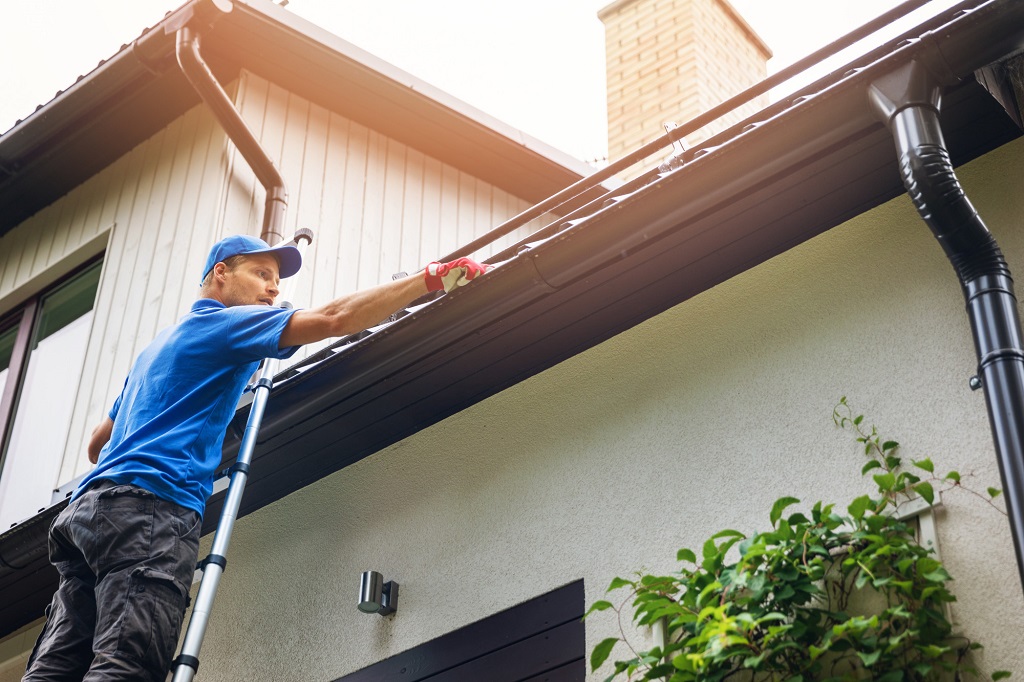Gutters serve an important purpose, protecting your home from costly damage. Unfortunately, gutters are often neglected until it’s too late. Getting on a ladder and cleaning your gutters is a more exciting chore, but it’s necessary. Gutter maintenance protects your property from expensive damage and helps it maintain its value and livability.
Water Damage
Gutters are designed to redirect rainwater and snow melt away from your house’s foundation and siding. When clogged, the water may pool near the house, damaging the siding and paint. The puddles of standing water may also damage your home’s foundation and cause it to crack over time. Ice dams developing on your roof is another issue brought on by a blocked gutter. These can cause leakage into your house, affecting the basement and other rooms in the home. A blocked gutter can also promote mold formation and mildew within your house, which might harm your family’s health. Keeping your gutters clean will prevent this from happening. If you notice any signs of a blocked gutter, call professional gutter services to perform an inspection right away. They can advise you of the best solution for your situation.
Debris Can Damage Your Gutters
Keeping your gutters clean is the best way to protect your home. Leaving them full of debris will cause damage to your roof and your landscaping. Standing water caused by clogged gutters can stain the siding of your home and deteriorate the appearance of roofing shingles. It can also erode the sand, dirt and clay under your home, damaging foundations and creating tripping hazards. Gutter cleaning should be done twice a year, once in the fall and once in the spring. To clean your gutters:
- Start at one end of the gutter and work toward the downspout.
- Spray the hose at full pressure down each drain spout to ensure it is unblocked; if not, use a plumber’s snake to remove the obstruction.
- Continue cleaning the rest of your gutters until you see water flowing out of downspouts at all times.
Keeping your gutters away from overhanging trees is important, as leaves and branches can easily clog the system.
Pest Infestations
When gutters are clogged, they can attract insects and rodents. Since these pests love sitting water, clogged gutters are the perfect breeding ground for them. Once comfortable in a moist environment, they can spread wood-destroying ants and termites around homes. They also serve as a magnet for mosquitoes notorious for carrying harmful viruses and diseases. The nutrient-rich debris in unmaintained gutters also encourages plants and weeds to grow. The area is a perfect nesting spot for birds, rodents, and snakes. Some of these pests are dangerous, like a snake bite from a rattlesnake that could lead to serious injuries. As these pests build their nests in clogged gutters, they can damage your roof and exterior siding. They can also cause leaks from roof vents, chimneys, and upper windows. It would help if you always worked with a reputable gutter maintenance service to clean your gutters. Gutter covers can also reduce the risk of pest infestations by blocking the entry points of unwanted organisms into the eaves and downspouts.
Landscaping Damage
Gutters divert rain and snow from your house, siding, and landscaping. A well-maintained gutter system protects all of these things from expensive damage. However, if your gutters are clogged with leaves, twigs, and other debris, it will prevent them from working as they should. Clogged gutters can cause roof leaks and damage. The water that spills over will wick into the sheathing and framing, causing rot and structural problems. Standing water in a clogged gutter can promote mold growth and spread disease. Damage to fascia boards and soffits is common when gutters are clogged or overflowing. These wooden components will rot and create a welcoming environment for pests like mice, rats, and bees. Clogged gutters can also clog downspouts, leading to downspout leaks or insufficient drainage. A professional gutter installer will ensure proper downspout positioning to avoid these issues. They may recommend downspout extenders to further direct drainage and prevent damage to the surrounding soil and landscaping.




